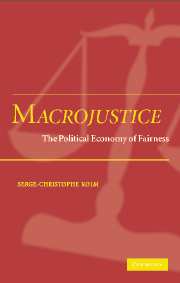Book contents
- Frontmatter
- Contents
- Presentation
- PART ONE BASES: CONSENSUS, FREEDOMS, AND CAPACITIES
- PART TWO OVERALL DISTRIBUTIVE JUSTICE: ELIE (EQUAL LABOUR INCOME EQUALIZATION)
- PART THREE COMPARISONS WITH POLICIES AND PHILOSOPHIES
- PART FOUR THE DEGREE OF COMMUNITY, EQUALITY, RECIPROCITY, AND SOLIDARITY
- 17 The degree of redistribution, solidarity, community, and reciprocity
- 18 Impartiality, consensus, and information
- 19 Disinterested judgments and the moral surplus
- 20 Communication and dialog
- 21 Impartialization to consensus
- PART FIVE COMPARISON WITH ECONOMICS' SOCIAL ETHICS
- References and bibliography
- Index
18 - Impartiality, consensus, and information
Published online by Cambridge University Press: 31 July 2009
- Frontmatter
- Contents
- Presentation
- PART ONE BASES: CONSENSUS, FREEDOMS, AND CAPACITIES
- PART TWO OVERALL DISTRIBUTIVE JUSTICE: ELIE (EQUAL LABOUR INCOME EQUALIZATION)
- PART THREE COMPARISONS WITH POLICIES AND PHILOSOPHIES
- PART FOUR THE DEGREE OF COMMUNITY, EQUALITY, RECIPROCITY, AND SOLIDARITY
- 17 The degree of redistribution, solidarity, community, and reciprocity
- 18 Impartiality, consensus, and information
- 19 Disinterested judgments and the moral surplus
- 20 Communication and dialog
- 21 Impartialization to consensus
- PART FIVE COMPARISON WITH ECONOMICS' SOCIAL ETHICS
- References and bibliography
- Index
Summary
THE VARIOUS ANGLES OF APPROACH
We have seen that the facts about macrojustice, the relevant unanimous views, and the structure of impartiality required by conceptions of justice, entail that distributive justice in macrojustice has a structure of equal labour income equalization (ELIE). There remains to determine and realize the degree of community, redistribution, solidarity, or reciprocity: coefficient k. Chapter 17 has shown various basic aspects of this number and of the realization of the corresponding distribution. We now turn to the philosophy and the techniques of its determination. Endogenous social choice requires that the solution be derived from the views of society and of its members. The approaches to this determination are amenable to a dual division concerning, respectively,“who” evaluates and what is primarily evaluated. On the one hand, the evaluation can be seen as collective, cultural, sociological, and the result of the public ethos and debates; or it can be seen as made by the individual members of society. On the other hand, coefficient k can directly result from the view about global aspects of the society such as its degree of community or solidarity, or of individualism; or it can result from judgments about the interpersonal distribution of income or welfare, given that this distribution has the structure of an ELIE for the indicated reasons. These approaches, however, join one another when they are sufficiently deeply worked out.
- Type
- Chapter
- Information
- MacrojusticeThe Political Economy of Fairness, pp. 298 - 303Publisher: Cambridge University PressPrint publication year: 2004



